Spontaneous Mutation Podcast
The Spontaneous Mutation podcast aims to reclaim the narratives around facial difference. In science, a spontaneous mutation is a genetic change with no known cause. This was the explanation songwriter and host Halley Elwell was given by doctors when she was diagnosed with Neurofibromatosis at age 11. No one else in her family has the condition, which causes tumors to grow on nerves and has affected the appearance of her jaw, chin, and neck. For this project, Elwell decided to use the term as an artistic lens. She knew what happened when a gene mutated and how it made her appearance change, but what happens when a spontaneous mutation occurs in art, conversation, or your life? Over the course of 7 episodes, Elwell and 5 guests explore the complex and profound insights that come from exploring the lived experiences of disability and facial difference.
Episodes
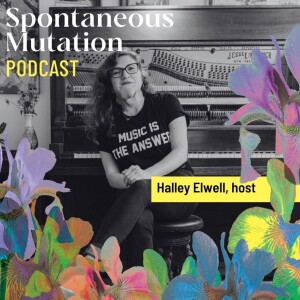
Tuesday Apr 01, 2025
Episode 1: How Do I Do This?
Tuesday Apr 01, 2025
Tuesday Apr 01, 2025
Here begins the journey of the Spontaneous Mutation podcast with Halley Elwell.
Who is Halley? What’s going on with her face and why is she singing about it?
The podcast opens with Halley sharing her experience living with neurofibromatosis and how the pandemic and a lesson in civil inattention made her realize that the way she was “getting by” was no longer working. She shares snippets of the interviews from her 5 guests and wonders what would happen if we take a medical term and use it as an artistic lens to change the way we look at facial difference. Thus, the Spontaneous Mutation project was born: an album and a podcast aiming to reclaim the narratives around facial difference with a song matched up for each episode.
This episode features 3 songs off the Spontaneous Mutation record:
“How Do I Do This?”
“The Raven and the Ponderosa Pine”
“Anomaly”
Keep up with Halley and the Spontaneous Mutation Podcast:
spontaneousmutationpodcast.com
instagram.com/spontaneousmutationpodcast
youtube.com/@halleyelwellmusic
---
TRANSCRIPT:
Hello and welcome to the Spontaneous Mutation podcast. I am your guide, Halley Elwell, and I'm a singer-songwriter with a facial difference. You may be asking, "what is Spontaneous Mutation?" and that's a really good question. In biology, it's a naturally occurring genetic event that happens by chance. There are no known outside factors, and no known cause. It just happens. Simple, right? Except when your cells have mutated, and they make you look different than the humans around you. And although cells have been mutating since the beginning of time, stories start to get told about these people who look different. And those stories come in all shapes and forms, and they inform how we treat other people.
I have neurofibromatosis. NF for short. I have red marks on my chest. I have what are called plexiform neurofibromas on my jaw and neck. And it looks different. It can probably be a little alarming to see if you're not sure what's going on. So, you know, I've gotten over this stage in my life where I've kind of thought nobody noticed. Um [laughs] I see you looking at me. And I see the confusion. I know. I know you notice. But what I can't get over is that I was told all my life that my face didn't matter. Just ignore it, and keep living your life. But the public has not seemed to get that memo. And it seems to be even worse since the pandemic. And I would argue during that time a lot of us became addicted to social media and became little voyeurs. Not gonna lie, the cognitive dissonance of being told all your life you're not supposed to talk about something and then having people constantly stare at you and be fixated on on that something all the time, kind of breaks your brain.
And it was truly the catalyst for Spontaneous Mutation, which is about reclaiming the narratives around facial difference and how we can use storytelling to do it.
I have decided to do something kind of scary for me, which is to tell you the story of me. I was a really sensitive little girl who was diagnosed with neurofibromatosis when I was eleven. And I had no words for my world except for the ones given to me by my doctor. You are an anomaly. You have a deformity. It was a spontaneous mutation. Now, it goes without saying this was completely disempowering but there weren't any other narratives around and I just kind of looked around me and went with the flow. And I came up with a strategy that worked [laughs] pretty well for me for a while: be as nice as possible. Be as smart as you can. Be funny, but don't steal the spotlight or folks will start asking questions. And don't talk about your condition unless you want to raise money for research. [laughs] But don't forget to sing, because they like it when you sing.
And maybe you have your own version of this. The part of you that society wasn't really ready to accept. The sad part. The different part. The part that really, really wanted to belong. You made do with the conditions you were presented with to get by until you could get out. And maybe you never got out. I'll tell you, my strategy worked for most of my life [laughs].
But then the pandemic came, and I got really, really, derailed. And the reason was because of masking. Um, wearing a mask for the pandemic made me realize I was being ignored and for the first time since I was about eleven years old, I was experiencing something called "civil inattention" which is a term coined by sociologist Irving Goffman. So civil inattention is the silent agreement those of us living in cities kind of live by. We pretend we don't hear our neighbors fighting next door. We pretend we are not pressed intimately close to a stranger on the train. In short, we mind our own business. We ignore people, and sometimes it's to our own detriment.
But when you have a physical difference, you don't get ignored. You become a walking museum. Operating hours are anytime you decide to leave your house. Some stare, and immediately overt their eyes when you catch them, while others just gawk. At these folks I roll my eyes. “Museum closed!” I want to say. And luckily for me, I don't get often get questioned. But when I do, it seems it's almost always in public, and it's humiliating! But with a mask on, in the winter time, when I could cover all of my differences up, I could not believe it. I was being ignored. And if anybody looked at me, they were looking me in the eyes and just noticing. It was not charged with anything. And the grocery store was a breeze, and as cliche as it sounds, I did. I felt a weight lift from me. It was a different reality! I wasn't so tense, I wasn't poised and ready to prove to everyone I was not a threat. And I got a glimpse at what I think the general population must feel on any given day. And I felt angry. Like, how much brain power and energy is spent each day just wading through the weight of everyone's gaze? And so this, my friends, is really where this story begins. Because after this realization, I could not pretend I didn't know. I had adapted a personality to live in this world, and now I had to figure out what parts were actually mine, and what parts I had created to survive. And the walls were finally down, and I had some painful truths to address.
So I did what any creative does, and I got curious and I wrote a bunch of songs and I titled the collection, "Spontaneous Mutation" and by the time I finished writing the album, I had read so many books and thought so hard on this subject, that I discovered a completely different self. I had words, and I had stories, and most importantly, I found a community of amazing people to continue this discussion. I have 7 episodes of storytelling and interviews, and really, just not interviews at all. It's a discussion on the topics we're told not to talk about. So for each episode I’ve matched up a song on the album with a guest, all of whom identify as either disabled or having a facial difference.
[Soundbite of Sora Kasuga] "Spontaneous mutation, I do think, is beneficial to our evolutionary growth. And not in the physical form, but in the social form. So we talk about the medical model and the social model of disability, and to tie that all in, right? Like, what if we are actually changing the world right now as we become empowered and more centered in our identities and we love ourselves more and each other more?”
[Halley] Author, Amanda Leduc:
[Soundbite of Amanda Leduc] “I think that’s the nature of mutation, is you can’t go back, right? There is a change that has happened in your life that, for whatever reason, makes the previous path, like, you just, you cannot go back to it. It’s like you’re standing on one side of a fissure that has suddenly opened up in the earth, and your old life is on the other side of that fissure, and you can’t go across it anymore. And you can either stand at the edge and look back to your old life and keep facing that way, or you can turn around and see what lies ahead.”
[Halley] Storyteller and humorist David Roche:
[Soundbite of David Roche] “As activism starts there's a tendency to say like, ‘people should not make fun of us, you know, we are people too.’ It's bigger than that. It's not like stop being mean and cruel, it's like, shut up and listen cuz we understand something about what it means to be human that you don't understand yet.”
[Halley] Researcher and disability advocate Rasheera Dopson:
[Soundbite of Rasheera Dopson] “I no longer adopt the trope of the ‘strong warrior’ like you know people are like, ‘oh you're such a strong warrior.’ I'm like, no I'm weak, I'm vulnerable, this hurts and I say that intentionally and I'm very transparent about that because I think those tropes indirectly rob disabled people of being able to feel and then also it takes responsibility away from non-disabled people to actually be okay sitting in the uncomfortable.”
[Halley] Social and Health psychologist Dr Kathleen Bogart:
[Dr. Kathleen Bogart] “Like Harvey Milk said you know, ‘come out come out wherever you are’ because otherwise people won't know that you know there are actually currently people who are in remarkable positions, positions of power positions of influence, doing great things who just haven't told people that they have a disability and so they are you know role models that haven't even happened yet. And when people do come out, right, we realize that hey, disability is actually really common.”
[Halley]: And we're going to unpack the things so many of us don't even know that we're running from: disability, difference, beauty and belonging, and the stories we tell that perpetuate so many of the myths that hold a lot of us back. For many of us, finding the time and support to work through our hurts and differences is just too hard, and the irony of course is that we hide, we ignore, or we villainize and bully those people who hold the insights that we all desperately need to heal.
Remember all that medical language I used to describe myself for this project? Instead of throwing it immediately into the trash, which is what I wanted to do for many years, I decided to recycle it and repurpose it. So what if you applied spontaneous mutation to art or dance or music or conversation… or your life? How would it change or shift? What gets added or taken away and what if that change was not good or bad but it just was, it was life?
I wrote this record for myself cuz I had to, but this podcast is for all of us because this is a conversation we desperately need to have in our country and our world.
The song you're listening to in the background today is called, “How Do I Do This” and for me it was about all the years I spent looking outside of myself for an answer and the massive anxiety that it induced. And in part of the song, which I'll play at the end of the episode, I'm saying, “how do I do this? How do I do this?” And then it breaks and it says, “Never Alone kid, never alone.”
And so I hope you'll enjoy these episodes with this in mind…We are never alone and I hope you'll find a bit of yourself in them. And I hope you'll start asking yourself, when was your spontaneous mutation?
[Music, “How Do I Do This” by Halley Elwell]
Never alone, kid never alone
how do I do this how do I do this
how do I do this how do I do this
how do I do this how do I do this?
Yesterday I felt okay went outside to the woods
The frozen air slapped me awake, if I'm gonna change,
I'm gonna change for good
[Music ends]
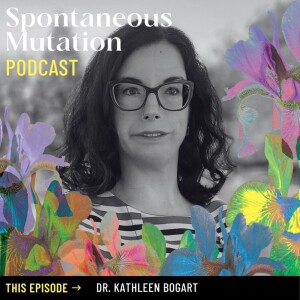
Thursday Apr 10, 2025
Episode 2: "Anomaly" with Dr Kathleen Bogart
Thursday Apr 10, 2025
Thursday Apr 10, 2025
In episode 2 of Spontaneous Mutation, Halley welcomes Social Psychologist Dr. Kathleen Bogart. Halley opens the episode sharing her experiences leading up to her neurofibromatosis diagnosis, and what is felt like to be called a “medical anomaly” by doctors. This, as well as an increasingly tumultuous home life, left her feeling like a burden. She talks about her early teen years and how poetry and female-fronted rock bands gave her a space to channel her confusion and anger.
Dr. Bogart shares her own experiences with feeling like an anomaly, what it was like to find the Moebius Syndrome community, and then the larger facial difference community. She educates us on the 3 most common models of disability and discusses her research in the field of rare disease.
The song for today’s episode is called: Anomaly
Dr. Kathleen Bogart bio:
Dr. Bogart is an associate professor of psychology at Oregon State University (OSU). She earned her Ph.D. in experimental social psychology from Tufts University in 2012. As a person with a rare disease, she has a passion for researching and educating about the psychosocial impacts of rare diseases, especially the effects of social support and stigma. Dr. Bogart is the recipient of numerous awards and honors and her work has been featured in multiple publications including the Atlantic and the New York Times. She also maintains a blog for Psychology Today called “Disability is Diversity” and one of my favorite articles from that blog is called “ The Elephant in the Room, explaining facial difference.” It’s a great introduction to the world and experience of living with a facial difference.
Keep up with Dr. Bogart:
Kathleen’s Disability is Diversity blog
https://www.psychologytoday.com/us/blog/disability-is-diversity/202301/the-elephant-in-the-room-explaining-facial-difference
Ted Talk:
https://www.ted.com/talks/kathleen_bogart_the_psychology_of_ableism_jan_2022?subtitle=en
Oregon State Faculty website:
https://liberalarts.oregonstate.edu/directory/kathleen-bogart
Keep up with Halley and the Spontaneous Mutation Podcast:
spontaneousmutationpodcast.com
instagram.com/spontaneousmutationpodcast
youtube.com/@halleyelwellmusic
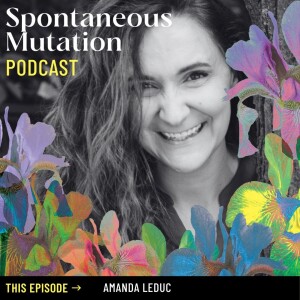
Thursday Apr 17, 2025
Episode 3: "Daphne" and the Stories We Tell with Amanda Leduc
Thursday Apr 17, 2025
Thursday Apr 17, 2025
In episode 3, Halley welcomes author Amanda Leduc to the Spontaneous Mutation podcast where they discuss her book, Disfigured: On Fairy Tales, Disability, and Making Spaces.
Halley opens the episode sharing her life-long fascination with the Greek myth of Daphne, a water nymph who was turned into a tree to escape the pursuits of the God Apollo. Halley was inspired to write this song and use Daphne as a metaphor for making the decision to stop pursuing surgery on her jaw. In her conversation with Leduc, they discuss expectations of stories and who gets to be the hero or princess, and how we make room for disabled stories. They also discuss creativity and writing, criticism, and the major turning points in Amanda’s life that led her to write the book.
The song playing on this episode is called, “Daphne”
Bio: Amanda Leduc joins us today to talk about her work and experience as a disabled creative and activist. In addition to Leduc’s book Disfigured: On Fairy Tales, Disability, and making spaces, which was shortlisted for the 2020 Governor General’s Award in Non-Fiction, she is the author of the Centaur’s Wife, The Miracles of Ordinary Men, and her soon to be published new novel Wild Life. Amanda has cerebral palsy and is a sought after speaker across North America on accessibility and the role of disability in storytelling.
Links:
https://amandaleduc.com/
https://amandaleduc.com/media/
https://www.instagram.com/amanda.leduc/
https://www.facebook.com/AmandaLeducAuthor
The “hope quote” that Amanda mentions during the podcast is hard to pin down, but we think it may be this quote from Jon Foreman, lead singer of Switchfoot: “hope is a defiant thing: hope stands on the bloody knuckles of a boxer, with bruised eyes and bloody teeth, broken ribs and a gut-wrenching smile. Hope rises up from the dirt, defiant and proud, beaten but undefeated."
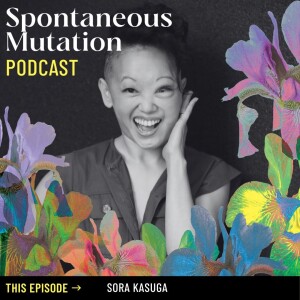
Thursday Apr 24, 2025
Episode 4: "Dear Lucy" with Sora Kasuga
Thursday Apr 24, 2025
Thursday Apr 24, 2025
In this episode, titled “Dear Lucy,” Halley invites activist and Faceout Project founder Sora Kasuga to the Spontaneous Mutation podcast to discuss the legacy of Lucy Grealy’s memoir, Autobiography of a Face, published in 1994.
Sora discusses her many spontaneous mutations in life and posits that we have not yet realized the social aspects of what it means to fully accept yourself as different and that might be the evolutionary key to advancing our society forward. She discusses her own ‘coming out’ story and honors the “disability doulas” who have helped her along the way, mentioning Alice Wong’s Disability Visibility anthology as a starting point.
The Music for this episode is “Dear Lucy.”
Bio: Sora Kasuga is the founder of the FaceOut Project, an activism hub and home for the global Facial Difference community to come together and collectively face out toward the world. Sora is a writer, a speaker, a model, circus artist, and face equality activist.
Sora’s experiences as a Japanese American, neurodivergent, queer person with a facial difference have informed and inspired their work in what Sora calls the “beautiful and challenging intersection of race, gender, sexual orientation, and disability.”
Links:
Faceout Monday Night Activism Cohort
Adult Facial Difference Community facebook group
Stella Young Ted Talk
Autobiography of a Face by Lucy Grealy
Disibility Visibility - Alice Wong
FACES National Craniofacial
Children’s Craniofacial Association
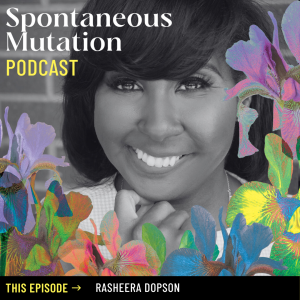
Thursday May 01, 2025
Episode 5: "Temporary" with Rasheera Dopson
Thursday May 01, 2025
Thursday May 01, 2025
Temporary: The Only Constant is Change
In episode 5 of the Spontaneous Mutation podcast, we welcome researcher and disability advocate Rasheera Dopson.
Halley opens the episode describing a particularly hard day she had after a check up at the hospital while she was taking what was being called the “miracle drug” for neurofibromatosis, which ultimately didn’t work for her. She talks about the hardship of putting your hopes in something that ultimately makes you really sick, and the decision to stop treatment to take care of yourself.
Rasheera shares about her Beauty with a Twist brand and discusses different kinds of beauty, walks us through applying a disability lens to intersectionality, and her experience working through the aftermath of a surgery she had on “Botched”, a plastic surgery reality show.
The music for this episode is called “Temporary.”
Bio: Rasheera Dopson (she/her) is a disability advocate, researcher, and digital storyteller dedicated to advancing equity for women and girls with disabilities. She is a PhD student at Northern Arizona University and the founder of the Womanhood and Disability podcast, where she amplifies stories at the intersection of disability and womanhood.
Links:
Rasheera's Facebook
Rasheera's Instagram
Goldenhar Syndrome: Learning to Embrace My 'Beauty with a Twist'
Rasheera Dopson: Black Women Leaders and Disability Justice
WomanHood and Disability Podcast
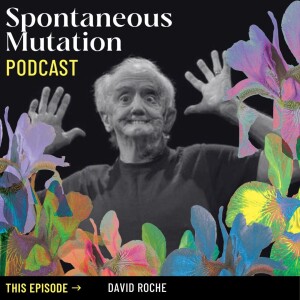
Thursday May 08, 2025
Episode 6: "Love Is...Everywhere" with David Roche
Thursday May 08, 2025
Thursday May 08, 2025
In the 6th episode of Spontaneous Mutation podcast, Halley recalls a turning point in her healing when she began to remember the good memories in her life, and specifically the love she experienced from her community, friendships, and family.
Her guest, author and humorist, David Roche shares stories from his life, reflections on activism, and if you listen closely, a guidebook to following your heart.
The song you hear on this episode is called "Love Is."
Bio:David Roche is an inspirational humorist and motivational speaker. In addition to appearing internationally as a guest speaker and headliner, he has been in multiple films and documentaries. In 2022 he was awarded the Order of Canada for his contributions to the field of disability art.
His first book, The Church of 80% Sincerity, is based on his signature one-man show of the same title. David was born in Hammond, Indiana, the eldest of seven children. His sixteen years of Roman Catholic education included four years studying to be a priest at Saint Lawrence Seminary in Wisconsin. And as you’ll hear throughout the interview, David’s life did not go as planned. Lucky for us, he has generously and hilariously shared so much of what he has learned along the way in his recently published book, Standing at the Back Door of Happiness: And How I Unlocked It
Links:
David's Website
"Love at Second Sight"
Church of 80% Sincerity
Standing at the Back Door of Happiness: And How I Unlocked It
Face Equality International
"Hollywood Must Face Up to the Way It Uses Disfigurements like Mine as a Metaphor for Fear"

Thursday May 15, 2025
Episode 7: "The Raven and the Ponderosa Pine"
Thursday May 15, 2025
Thursday May 15, 2025
This is the final episode of the Spontaneous Mutation podcast, where the story wraps…for now!
Halley shares that throughout the podcast she was searching for a story she could relate to about a dysfunctional family to discuss the extra layers of grief that get mixed into self-perception. So she shares more of her own struggles to better understand why it took her so long to reflect on the impact her condition and facial difference has had on her socially.
She segues into the origin story of the song, “The Raven and the Ponderosa Pine,” and ties it to one of the most enduring American tropes, that of the lone cowboy, and how easy it is to fall into isolation and despair when you believe yourself to be alone.



